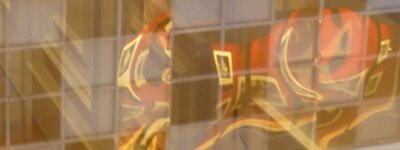Eidon wrote a beautiful short piece called “per Tiziana”, with two different arrangements. Listening to these two quite different versions, I wondered if I could make a third arrangement.
This is again a twin post, the other version is on Eidon’s blog.
Eidon says:
“Conjure is an interesting word. It comes from Latin, from “cum iurare”, which can be translated back as “command on oath” (late 13c.) or “summon by a sacred name” (c. 1300). Indeed, my experience with composing music is often one of inverted conjuring. Inverted because I do not conjure anything – it is I that am commanded, in fact; and the sacred name, the kotodama if you like that puts me in motion and turns me into its servant, is the music theme that visits me.
That is what happened with “Per Tiziana” too. Its theme came to me and made me swear that I would serve her well. In practice, this meant that, for days and days and days, the theme of “Per Tiziana” stayed with me all the time. Although I was doing other things, the background (and often the foreground) thoughts were “per Tiziana”. In retrospective, rather than composing it, I was trying to remember it – reconstruct it…
Multiple times I tried to put it down and found myself thinking: “That’s not it”. When I finally got it (to some extent) right, I found that its decoration with other voices would take me much less than I had expected. Flute, vibraphone, alto sax, cellos, pizzicato strings, timpani, drums, and electric guitar were my initial choices. You can listen to the result here. I also produced a second take, only based on piano, timpani, and drums.
And yes I was happy with the result! I thought to myself, “This is the track that best represents me thus far”. So much so that, even after the finishing touches, I found myself still “conjured” by this track: I could still not think of anything else but her…
But dear friend Wim came to my rescue and released me from my oath! He had liked “Per Tiziana” and told me that he had a new instrumentation in mind. I was very happy of this – Wim has a special gift for instrumentations, and that was also a way to sign my contract off with that piece, in a sense.
Oh my god, by any chance did I pass on the conjuring?! I’ve just realized that! Ouch, not so nice of me…
And so Wim took over. For some reason, I had expected an instrumentation with classical music instruments, though Wim truly surprised me with something radically different. And I liked it very, very much! The new manifestation truly resonated with me, and I’m very happy of this wonderful present that Wim had for me. Thank you very much, Wim ^__^
When listening to the new instrumentation I realized that I wanted to have an extra final note to the piece.
I hope one day we may truly write a piece together from beginning to end: maybe a new piece for our Wim and Eidon album!
Wim says:
“My original idea was to try and merge both of Eidon’s versions into something new. But when I listened very carefully to both versions, I realised that wouldn’t work. Each in its own way was already complete. So I had to try and create an entirely different arrangement. I started from the original arrangement which as Eidon explained has six voices: vibraphone, two cellos, electric guitar, timpani and drums. Eidon kindly provided the MuseScore files.
As Eidon has guessed, my first attempt was an orchestral version, because I am comfortable with that: strings, cellos, bass, a clarinet for the main melody, orchestral percussion. It was easy to do and the result sounds nice enough but it did to my ears not really “work”. One issue is the note duration and range which are not a perfect fit for the string instruments. The other is more fundamental: the complex drum pattern in the second part of the piece simply does not work with a symphonic arrangement.
This got me to think about the percussion. Because it is a repetitive pattern, I wondered if it would sound good on a drum machine. For some reason – I guess by association with the band 808 State – I thought specifically of the Roland TR-808. That lead to the idea of using old synthesisers for the other voices as well. I experimented with a few and at a certain point I literally laughed out loud because the combination I hit upon worked so beautifully!
I shared a first cut with Eidon and he suggested to bring out one of the voices more. I had also commented on the note duration and he explained that the initial instrument he had chosen was a vibraphone that had large preset values for sustain/reverb. I also was not satisfied with my choice of instrument for the timpani voice, and the volume of the drumset voice.
My final arrangement is as follows: polysynth for the lead voice, synth bass 1 and 3, Moog pad, Roland Brightness from RKHive for the timpani and the TR-808 drum machine. I changed made the last note in each phrase of the main melody longer and simplified the electric guitar score a bit so that it sounded more natural for the Moog pad. I kept the percussion volume relatively low.
Eidon did a final tweak, adding an extra note to complete the piece, and we’re both very happy with the result. I really enjoy making these alternative arrangements of Eidon’s work, so really it is I who should thank him for creating these wonderful pieces. “
Here is the finished track. We hope you like it!
The track is also available:
–>
